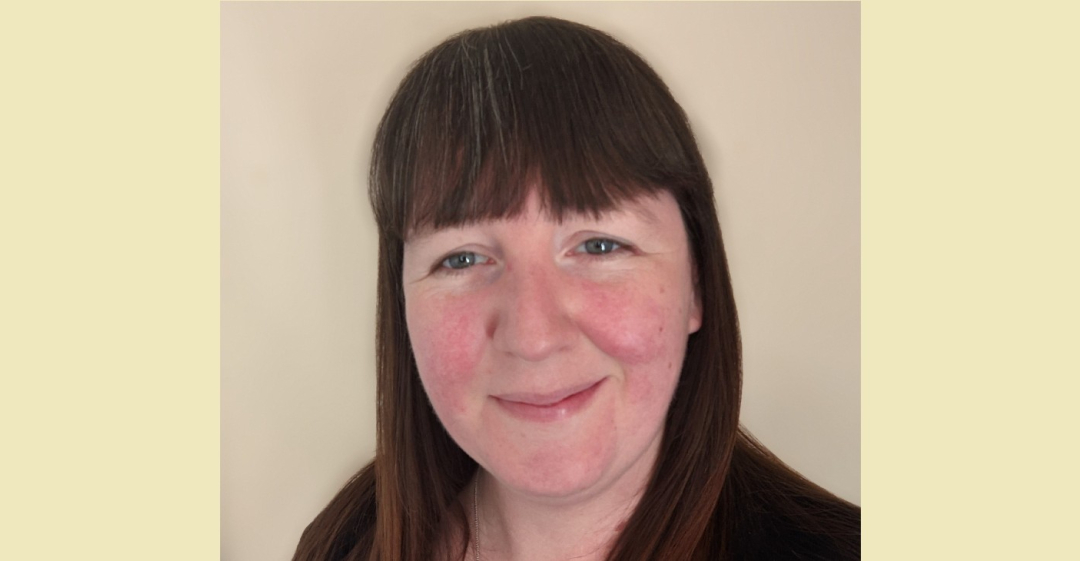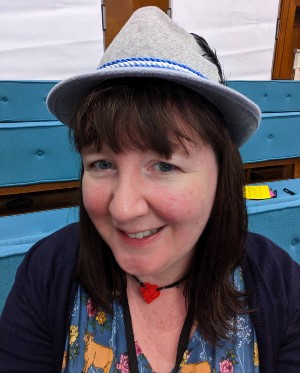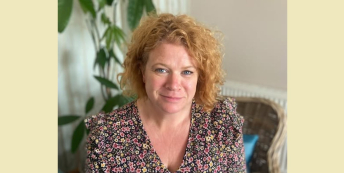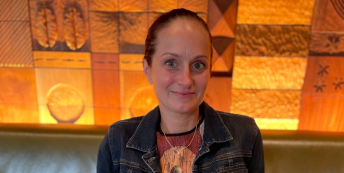“I was beginning to be less fulfilled by my work and needed to make a change.”

What work were you doing previously?
Pretty much my quest in life had been to be an accountant.
I decided at the age of seven that it was what I wanted to do, and that was it. All my studies and work experience had been about becoming an accountant.
When I decided to make a change I was working as a finance business partner with a UK charity.
What are you doing now?
Now I’m a freelancer, who uses a whole different range of skills to help organisations and teams to achieve their goals.
This covers anything from facilitating the creation of strategic plans and detailed delivery plans, to programme management, and coaching and mentoring team members.
I don’t really have a job title, and in my main role I’m known as their “Jill of All Trades”. If something needs doing, and nobody in the team has it as a specialism, it pretty much ends up on my desk with a “I bet Vic could help with this…”.
I’ve recently also started doing some evaluation work. This is usually linked to projects. It’s all about helping people to understand the change they want to see by doing their work, and then seeing whether they have had the desired outcomes at the end of it.
How did you feel in your work before you decided to make the change?
I was starting to realise that while I worked for an incredible organisation and had incredible colleagues, I was beginning to be less fulfilled by it and needed to make a change.
But I didn't have any idea about what that change would be because my life had been all about accounting. So it was really hard to talk to people and say 'I'm not sure I want to do this anymore'.
When was the moment you decided to make the change?
At the same time I was starting to think about my shift, my partner was put on the list multiple times for redundancy (which didn't come to pass).
During that time because my job paid well and was really steady, we put my shift on the back burner.
He was finally made redundant and we had lots of discussions about it. He'd always wanted to make a career change but hadn't had the guts to do it.
He was a hardware engineer and really wanted to change to be a software engineer, and while it might sound similar it's actually like starting from scratch. You'd have to learn new languages, skills, and join new teams.
After a lot of deliberation he decided to do it and make the switch.
And he was the absolute happiest I've ever seen him. He was excited to go to work everyday. He was learning new skills, he'd embraced the change and he was just so happy. He inspired me.
So, on the day he passed his probation period for his new job, I went into work and said 'I think it's time for me to go'.
How did you choose your new career?
I'd spent the previous two years doing the things that aren't that helpful – looking at job alerts every day.
All I saw was the same role I was doing, but with companies I wasn’t excited to work for. I couldn’t see how that was going to be a better situation than the one I was in. I didn’t know what other job titles to look for, and even if I did, I didn't have any of the qualifications and experiences they were asking for.
I'd tried to look into career change services, questionnaires to do online, and all they seemed to say was 'you're really good at finance, do that'. But I wanted to do something else.
Then after some searching I came across Careershifters and I had some friends over. Me and two friends dialled in to a Careershifters webinar to talk about the Career Change Launch Pad. The three of us all said to each other 'we need to do this'.
As part of the Launch Pad I came out with three career themes that resonated with me. From that, through talking to people about them and what's important to me, I was able to generate a list of about 70 possible career ideas.
Some of them I put on the back burner as I didn't think they sounded so much like me, but I picked a few to explore and test.
Are you happy with the change?
Yes!
I’ve worked with different organisations over the past few years, and I really believe in the work that they do, so playing a small part in their success makes me feel incredibly fulfilled.
I have a great variety in my work, and I’m always learning something new.
What do you miss and what don't you miss?
I miss being part of a team.
A lot of the work I do is supporting people with specific projects, whilst they’re also still doing their day job. It can be hard when the thing that’s your main focus is only a part of what someone else is doing.
I also miss the structure of a Monday to Friday, nine to five job. Whilst the flexibility is great, when you’re trying to fit in around everyone else’s commitments, it can be difficult to make your own plans. It’s something I’m getting better at, along with my ability to say no.
How did you go about making the shift?
It’s all been about having conversations with people, and not being afraid to say what I’m exploring and feeling passionate about.
When I left my role, I’d taken up a volunteer role doing something completely different, and happened to be there on a day where there was a tour happening to go on the roof while there was scaffolding up. Because I knew the people who work there I was able to go up too.
I went up with a former colleague and we got chatting. Afterwards we went for a drink together and chatted about all the things I'd been doing since I finished work.
The next day I got a message from her saying 'I've been talking to my husband about all the stuff you've been doing. He's been doing some volunteer work with a charity and they could do with the training you've been doing.
Would you be interested in coming tomorrow to talk to them about what you've been up to?'
So we went for dinner and by the end I'd signed up to help do strategic planning with this small charity.
It just happened, and it happened very quickly. Within five days I'd gone from turning up to a volunteer shift, to meeting up with a charity to talk about using my new skills to help them do some work.
And that’s just one example.
Trying out new things and then talking to the people around me about what I was doing opened more doors for me. In the past five years I’ve done freelance work with a range of organisations, and it has all come from word of mouth, rather than submitting tenders to advertised pieces of work.
Now, the people who I work with recommend me to others, and so they’re doing the hard work for me.
How did you handle your finances to make your shift possible?
When my partner was made redundant we'd put six months worth of mortgage into a bank account.
Having that cushion enabled me to stop working without having anything lined up.
We also worked out a budget, and a minimum earning level that I needed to achieve. Within six months I’d earned the target for the first year, and although it was less than I used to earn, we were able to adjust our spending and live comfortably with our new income level.
It’s funny, but being happy and fulfilled with work meant we didn’t need multiple holidays a year or meals out every week. We were spending that money to escape from how we felt about work, and with both of us making big changes, we didn’t need to get away from it all in the same way.
What was the most difficult thing about changing?
It’s really hard to go from being a credible expert to someone who is exploring and who has no idea what they’re doing.
You feel like you’re starting from scratch (even when you’re not really as you have loads of transferable skills and knowledge, but you just can’t see it).
It’s hard enough doing that, and then on top of that sharing your story with people and being open with them about it can be really challenging. I don’t think I’ve ever felt so vulnerable.
The other thing that’s hard is meeting new people. The inevitable question “so, what do you do?”. How do you answer that when you’re transitioning? Even now, I don’t know how to answer it. I answer differently every time someone asks, maybe one day I’ll finally know.
What help did you get? 
Careershifters has been a huge support.
As well as the structure of the Launch Pad, and the amazing team members supporting you along the way, having a community of people who are in a similar position who have your back and are there as your constant cheerleaders, or even sometimes your guinea pigs, is a huge help.
The analogy I often use with people, is that I had found myself painted into a corner of a room, with no way out. The Launch Pad didn’t come and lift me out of the corner magically, but instead brought me some pieces of wood, and showed me how to lay them down to get myself out of the corner.
Sometimes it would be small steps, constantly moving the same small plank over and over, making tiny steps forward, sometimes the planks got bigger, or I gained confidence to navigate increasingly larger gaps between those planks.
But I now feel like I’m in the middle of the room with so many pathways I could take.
What have you learnt in the process?
I'm starting to understand a lot more about the skills I already have and what I can bring to the party.
Early in my shift, I helped support five meetings for a charity, doing some facilitation with them. I came out of a meeting with them and they asked me “is this working for you, are you getting a lot out of it?”. I was honest and said “yes, but I wasn't sure if you guys needed me?”
They replied “oh yes, we needed you, we totally need you” which was great as I'd had a bit of a wobble the day before.
One of the nicest things they'd said to me was “we totally value your input on this and actually, as an organisation, the ability to bring you in to help with this is making my whole team feel more valued because we're bringing in external people to support them”.
All of a sudden I felt so much more confident, having senior people at the charity tell me I was bringing so much value to the process.
I’ve learnt that people are busy and they're not going to invite you into a process unless they genuinely think you can add value to it. So just by being invited in, they already value you.
If you've been using your network to find leads or connections, just the fact that your network is recommending you means they see your value.
So you should be confident that people do see your value and what you can bring.
What would you advise others to do in the same situation?
I think what's helped with this process is that I've been very open with people about what I've been doing – not selling myself, just sharing things I'm interested in and genuinely excited about.
For me that's where a lot of opportunities have come from, because I just talk to people with passion about what I'm doing and they can see the excitement. I think they can quickly see how this could transpire into work I could do with them.
So I’d recommend talking to as many people as you can, with honesty and authenticity, about what you find interesting. Not even what you can do for them, just about what you find interesting.
Be aware of your network's network. I took on opportunities through my volunteer work mostly to enhance my network.
For one of the charities I support, they requested if someone would come and talk at a conference about the volunteer model that they use and I immediately said yes. There were 80 charities in the room. I took the opportunity to speak to people.
I spoke to some people where I was very much the voice of the charity, and then over lunch and breaks I spoke to people about myself, the things I was doing and how I saw the work I was doing being relevant to smaller charities.
Off the back of that I got about five or six contacts I didn't have before. I didn't go there as a networking opportunity, but it very much just turned into one.
Also keep a diary or record of all the things that you do towards your shift. On the days that you're having a bit of a challenge or feeling down, having that record or list lifts your spirits and gives you a bit of energy.
It's so easy to forget all the things you've done, or forget to celebrate the little things along the way.
Vic took part in our Career Change Launch Pad. If you're ready to join a group of bright, motivated career changers on a structured programme to help you find more fulfilling work, you can find out more here.
What lessons could you take from Vic's story to use in your own career change? Let us know in the comments below.



